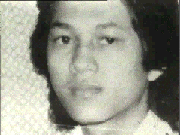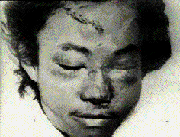|
 Although a United States judge has ruled that the Marcos estate owes billions of dollars to victims and families of victims who suffered torture, death and other Although a United States judge has ruled that the Marcos estate owes billions of dollars to victims and families of victims who suffered torture, death and other  atrocities during the rule of the Ferdinand Marcos' regime, the victims have yet to see a penny of what's believed to be the largest award for human rights violations anywhere in the world. atrocities during the rule of the Ferdinand Marcos' regime, the victims have yet to see a penny of what's believed to be the largest award for human rights violations anywhere in the world.
A U.S. court ruled that in August, 1977, two months before his 22nd birthday, Archimedes Trajano was beaten, tortured and killed for asking a question in a public forum of Imee Marcos, eldest daughter of the late Ferdinand Marcos. Trajano was one of thousands of Filipinos who lost their lives under the Marcos dictatorship.
"My son just asked a question in an open forum. Open forum you can ask a question, yeah? And they should answer. But I think that Imee didn't  like the question. Right then and there he was forcibly taken by the security guards," said Agapita Trajano, Archimedes´ mother. like the question. Right then and there he was forcibly taken by the security guards," said Agapita Trajano, Archimedes´ mother.
At the time of his death, Archie's mother was told he had been in a dormitory fight and Philippine newspapers reported he had "run amok." But witnesses came forward later to testify that her son had been forcibly removed from the university forum by Imee Marcos' security guards and that was the last they had seen of him.
"He was covered in a white sheet, laying on a table. And when I opened the sheet...I saw him blue-black....I could not talk... nothing... but I think my heart hardened. I said, my God, why him?" Agapita Trajano said.
 In 1993, A U-S Federal Court in Honolulu awarded Agapita Trajano and ten thousand other Filipinos two billion U.S. dollars in damages for human rights violations covering torture, disappearance and murder under the Marcos regime. Despite a federal court decision to award the victims compensation, they're not likely to see any money soon. The Phiippines government has its own idea about what to do with the Marcos assets. In 1993, A U-S Federal Court in Honolulu awarded Agapita Trajano and ten thousand other Filipinos two billion U.S. dollars in damages for human rights violations covering torture, disappearance and murder under the Marcos regime. Despite a federal court decision to award the victims compensation, they're not likely to see any money soon. The Phiippines government has its own idea about what to do with the Marcos assets.
The Philippine government has passed legislation mandating use of the Marcos' "ill-gotten wealth" for the country's agrarian reform program. But Philippine government officials say the law could be ammended to allow for some compensation to human rights victims.
 The Marcos' amassed more than one billion U.S. dollars during Ferdinand Marcos' 14-year rule. Three hundred fifty-six million dollars of that is frozen in Swiss bank accounts. The Marcos' amassed more than one billion U.S. dollars during Ferdinand Marcos' 14-year rule. Three hundred fifty-six million dollars of that is frozen in Swiss bank accounts.
Meanwhile, the Philippine government drew up a contract with the Marcos family that allows the Marcos to keep 25 percent of the money. Seventy-five percent would go to the Philippine government. No action to carry out the agreement has yet been taken, but in the eyes of many of the victims and their families, this deal is seen as underhanded cooperation between the Philippines government and the Marcoses.
 "I think it's troubling that they would enter into an agreement, the intent of which would be to deny citizens of their own country, who are the victims of torture, summary execution and disappearance under the Marcos dictatorship; that they would enter into an agreement to deliberately deny those people compensation," Sherry Broder, Plaintiff's attorney. "I think it's troubling that they would enter into an agreement, the intent of which would be to deny citizens of their own country, who are the victims of torture, summary execution and disappearance under the Marcos dictatorship; that they would enter into an agreement to deliberately deny those people compensation," Sherry Broder, Plaintiff's attorney.
"These agreements were being negotiated but they never materialized - they were never concluded. And the President of the Philippines, was, never, he did not give authority for those agreements. So, um, while there may have been attempts to negotiate, the Marcos' set up impossible conditionalities, that are probably not even worth negotiating about," said Solita M. Aguirre, Philippines Consul General - Honolulu.
While nearly everyone agrees that those who suffered under Ferdinand Marcos' dictatorship should be compensated, the attorneys, Philippines government and Marcos family continue their maneuverings -- and lengthy court proceedings -- for their piece of the money. With these competing interests the victims may not see anywhere near the two billion dollars they were awarded... if they see any compensation at all.
"The judgment in itself is already a victory for the victims So, I think on a more realistic attitude, we have to see what is a real attainable amount," said Solita M. Aguirre, Philippines Consul General - Honolulu.
"I wish they would have it in their hearts to think of all these people that suffered. They have money. They [should] share it with these unfortunate people who lose their children... son, daughter or whatever. They have the money, they can afford it," said Agapita Trajano.
"Marcos fled the Philippines in 1986 and this is already almost 10 years later. And I think that it's really time the families of people who were executed and who disappeared and who are living without their breadwinner or without their mother, that those people should be entitled to compensation now. Time is really running out for compensating them," said Sherry Broder, Plaintiff's Attorney.
In a hearing on June 29, 1995, U.S. Federal Judge Manuel Real ordered that Mrs. Marcos and Bongbong Marcos sign papers that would give the victims access to deposits in Swiss bank accounts. He also ordered that if the Marcoses fail to take this action, a federal court clerk will sign for them.
He further fined the Oklahoma law firm representing the Marcos estate $114,000 for accepting deposits and making payment for the estate, in violation of court order.
Producer/Reporter: Malia Zoghlin
Production Team: Glenn Yamamoto, Joy Chong-Stannard, Rana Wasai, Duane Ikeda, Erin Masuda | 
